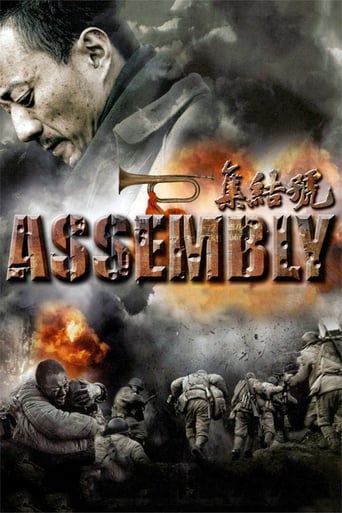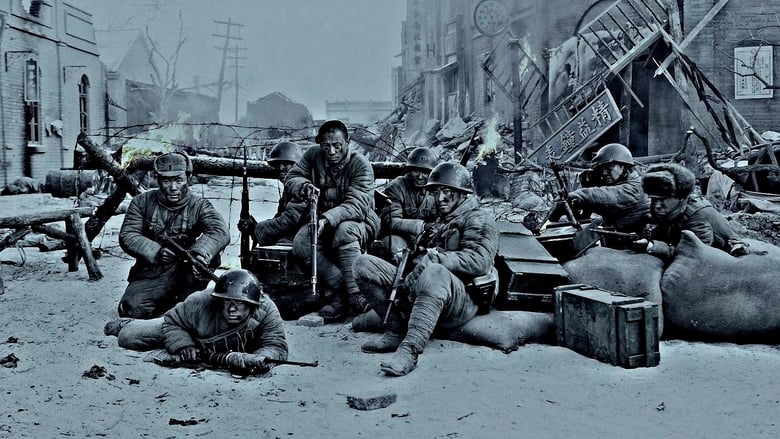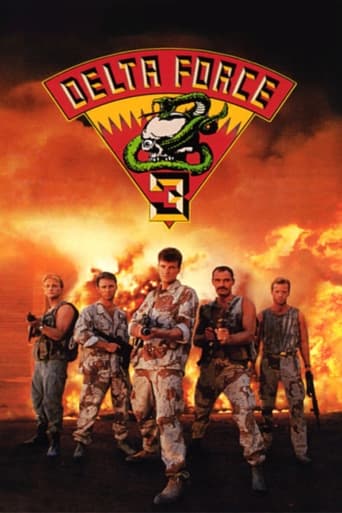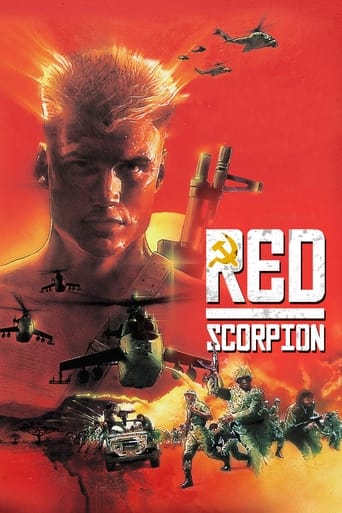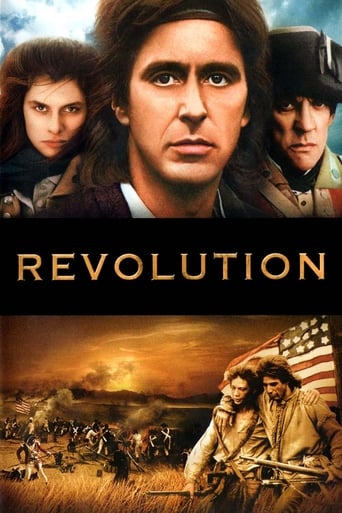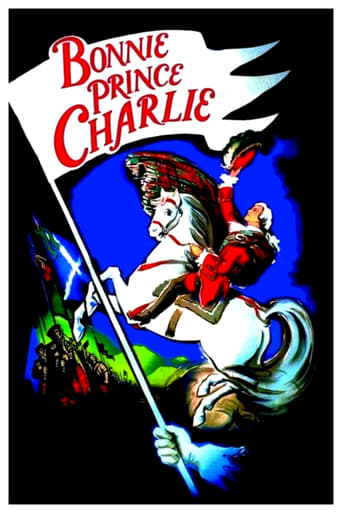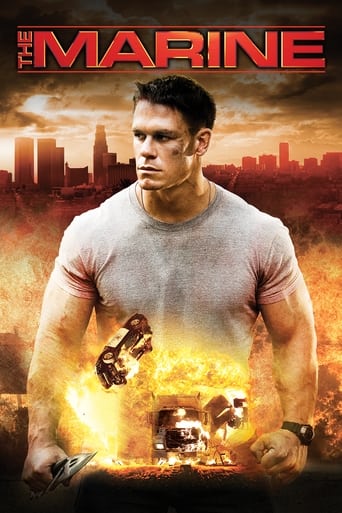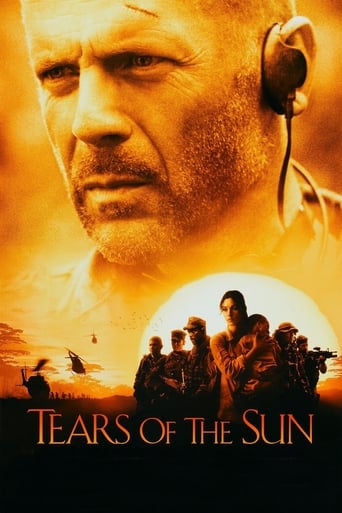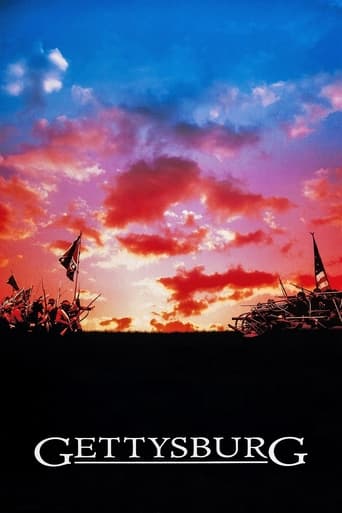Assembly (2007)
Follows a soldier trying to gain recognition for comrades who died in 1948, at a turning point in the civil war between the communists and the nationalist forces of the Kuomintang.
Watch Trailer
Free Trial Channels
Cast


Similar titles
Reviews
One of the best films i have seen
Great visuals, story delivers no surprises
Excellent, Without a doubt!!
An old-fashioned movie made with new-fashioned finesse.
The concept of war has been familiar to the Chinese experience for millennia. While other people from different parts of the globe are no strangers to the phenomenon themselves, the Chinese do hold a special distinction. The ancient Chinese military strategist, Sun Tzu, wrote The Art of War in the 5th century about 1500 years before the invention of gunpowder. Simply put, the Chinese have been writing and depicting war far longer than most of the world. Given this fact, it's more than a little shocking that the modern Chinese film industry seems more interested in martial arts style films than genuine war films. Fortunately, the 2007 film Assembly (集结号) offers a refreshing change of pace from the usual fare. For viewers looking for blood and guts, Assembly delivers within the first fifteen minutes. Perhaps Assembly is sometimes gratuitous with the amount of violence and carnage depicted on screen. But the real history is just as bloody. Perhaps the film is doing the real story justice. Assembly is based on the incredibly true story of Captain Gu Zidi, a People's Liberation Army veteran of the Chinese Civil War. In Assembly, Zhang Hanyu takes on the role of Zidi and depicts the soldier's story starting from his time in the People's Liberation Army during the Chinese Civil War to his service in the Korean War and retirement from military life. In many ways, Zidi is an embodiment of the People's Liberation Army. He was born poor, remains mostly illiterate throughout the film, and is left to face immeasurable odds by politicians and generals who couldn't care less about him. Zidi is not a caricature of a soldier. He is a soldier and consequently commits seriously heinous actions while engaging in war. In the opening scene of the film, Zidi guarantees himself a spot in hell by executing a number of unarmed nationalist soldiers in rage. During a dark time for the People's Liberation Army of China, Zidi meets with a Colonel who orders him and his unit to defend an abandoned mine until they hear the order to retreat which is the sound of a bugle. While giving these orders, the general appears so calm that even he seems to have forgotten the true hopelessness of the situation. The bugle call never comes and Zidi's entire unit is wiped out in the ensuing battle. Zidi survives the encounter, but since the bodies of his fallen brothers in arms are never recovered, all soldiers in Zidi's 9th Company are treated as nameless martyrs. Their sacrifice is mostly ignored. Assembly is the story of how Gu Zidi returns in his old age to the mine where his comrades in 9th Company valiantly gave their lives in order to find their bodies to gain proof so the government would recognize their sacrifice. Once you get past the gratuitous violence depicted in the war scenes, you begin to realize that Assembly is more than just a war film. It is a story of redemption. Not just for Gu Zidi and his lost comrades, but also for the government of China. Thanks to Zidi's efforts and through this movie's message, China can recognize the sacrifice of thousands of nameless martyrs who secured China's stability at the cost of their lives. It may be impossible to remember all of their names. But it is beyond shameful to try and forget. War is a manifestation of human tragedy. It is the culmination of mankind's worst attributes. What makes Assembly such a great film is that despite the gratuitous blood and violence, both of which there is no shortage of during times of war, the movie presents a clear anti-war message and ends on a poignant note.A running joke throughout the film is based on the fact that Captain Gu Zidi lacks a proper name. "Gu Zidi" as a name literally translates into the phrase millet field. It's almost absurdly generic. Yet, by the end of the movie, Zidi's name becomes legend and his efforts to preserve the legacy of his comrades in arms are both commended and rewarded. His name is remembered. Therein lays the real tragedy of war. As Gu Zidi discovered in his old age, names and sacrifices are more easily forgotten than they are remembered. In his old age, Zidi sees the endless piles of graves that have piled up as a result of the Chinese Civil War. Upon noticing that the majority of the graves in the scene lacked any references to names, Zidi ponders, "Their parent's gave them names. How did they all become nameless children? ". The ending title of Assembly informs the audience that the real Gu Zidi died at the age of 71 in 1987. He didn't die a nameless martyr. His name was given to him by a shoemaker who had found him abandoned by his parents when he was three months old. He was named Gu Zidi because the location where he was found happened to be a millet field.
Deep and genuine, film about human honor and loyalty. Belief and faith. Showing the futility of military conflicts, their rudeness and callousness.A film that deserves to be seen. In which we can see how important it is to be on the first human beings and secondly, supporters of any regime. A film that says a lot more about itself when viewed. Tales of sacrifice and willingness to sacrifice someone else (which I leave with absolutely no comment because of the absurdity of justifying such behavior).My blog: http://vihrenmitevmovies.blogspot.com/
I have heard a lot of good things about this movie, so I decided to watch it.Well, it wasn't as good as I expected at all. Essentially, it is just another Chinese communist propaganda. No matter how big the mistake the Party made, in the end, the Chinese communist party always does the right thing for its people. That is basically what every mainland Chinese movie is all about. This is just another updated version with better picture quality and better sound effects.For mainland Chinese people, they got brainwashed by the Chinese communist party. Of course, they love this movie. It makes them feel so touched and "proud". There is nothing to be proud of, because the Chinese communist soldiers were killing the Chinese nationalist soldiers who were also Chinese. At that time, the Chinese communist soldiers would be labeled at anti-government terrorists according to today's standard. If the Chinese communist party didn't win the civil war, China might be a better country than it is today. And look at today's China, so many common people have so many things that they want to complain to the communist party, but some of them were even sent to the psychiatric hospitals.The first hour was way too long. It was a simple story, there is no need to show the audience one event for an entire hour. Some of the scenes remind of me "Saving private Ryan." Remember people, only good things about the Chinese communist party are allowed to be made movies. The bad things are not even allowed to be published anywhere inside of mainland China. Those oversea web sites are also blocked inside of mainland China. That is the reality.
I gotta say that in the first 40 minutes of the battle show, I did spot scenes from Saving Private Ryan, Band of Brothers and the Korean: Taegukgi hwinalrimyeo (http://www.imdb.com/title/tt0386064/). Actually, I'm not surprised at all, I mean who (the directors) wouldn't do the same thing? Some directors might curse Steven Spielberg for not leaving them much room to shoot a different war movie after Saving Private Ryan, and indeed this movie has, in my opinion, in no way transcended the 1998 war masterpiece. Still, I'd like to give credit to this Chinese director for his guts to do such a Chinese war movie that well handles battle scenes with great details, tells the audiences the past without being necessarily affected by current Chinese politics, and touches a lot of people simply because most of the story feels just down to earth and so damned real. I won't go any further on these points, because there's one more significant thing about this movie, i.e., it's the first of this director's works that could be appreciated by all the audiences other than those from mainland China only. The director has been a big name in Chinese movie industry by the end of last century, bringing Chinese fresh outlooks about domestic movies. However, one could probably better understand the director and his previous movies only from a "Chinese" perspective. And when I say "Chinese", I mean you'd better be living in mainland China, excluding SARs like Hong Kong. But this time, as I said, it's quite different since anyone could understand and appreciate the story. It's a good shot to see how far Chinese movies can go internationally without the presence of Kongfu and male characters with long braid at the back of their heads, without the setting in a remote and underdeveloped Chinese countryside, and without bold and overused sexual scenes.I read about this movie on the internet for the last few days, and it was this piece of information from a Chinese blog that drove me to watch it, and I quote and translate this information as follows: "... at 23:00 when the movie Ji jie hao ended in a Beijing's big movie theatre tonight, with no presence of any of the directors and actors with the movie, the audiences were unwilling to leave their seats, and along with them was only their tears and standing applause." With no stars in this movie, it was reported that the box office hit 2,000 million Chinese dollars 2 weeks after the premiere in China. I will definitely encourage both Chinese and non-Chinese to watch this movie. And for those who might be interested in our ancient country, I recommend two other quality movies: Huozhe ("to be alive" 1994) http://www.imdb.com/title/tt0110081/; and Ba wang bie ji ("farewell, my concubine" 1993) http://www.imdb.com/title/tt0106332/.

